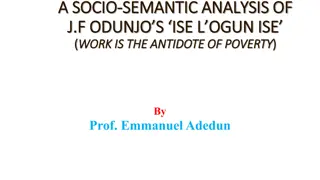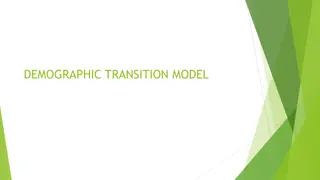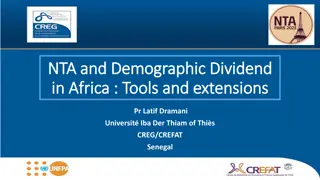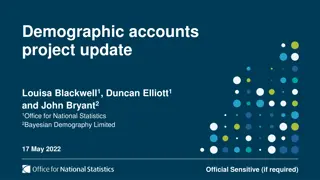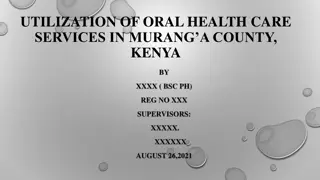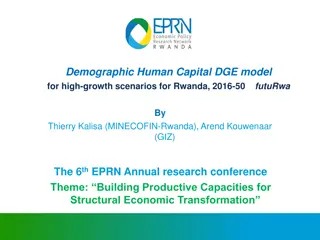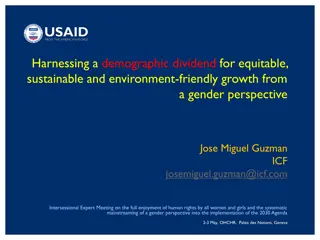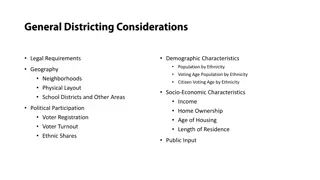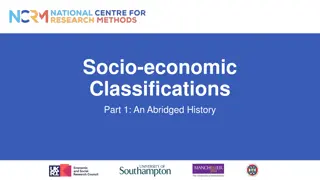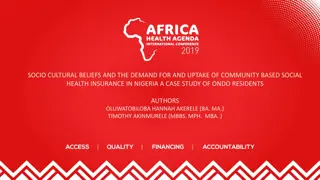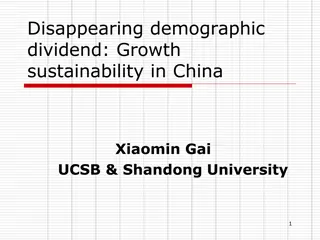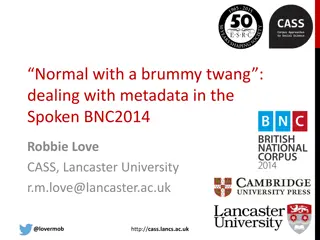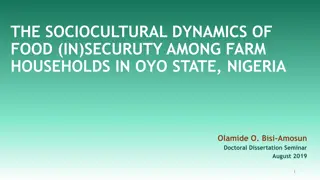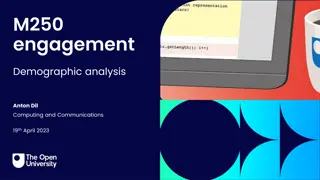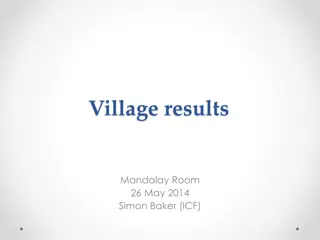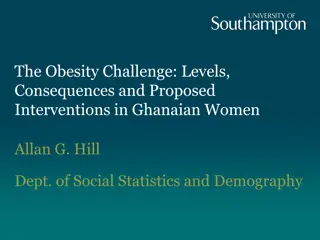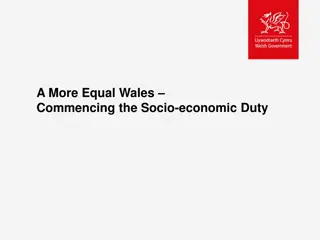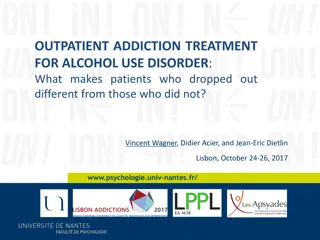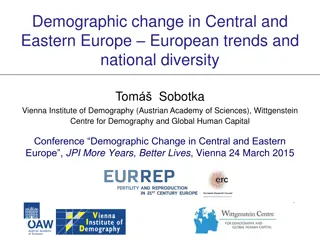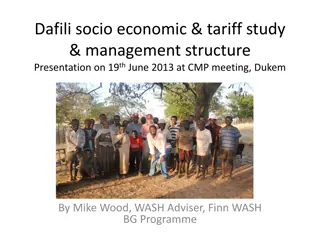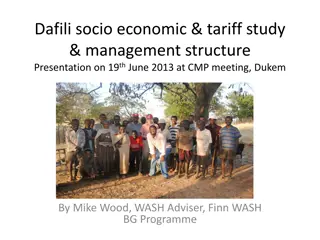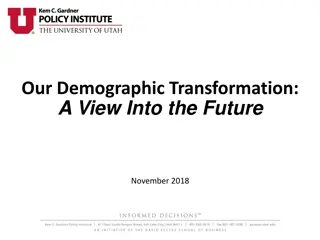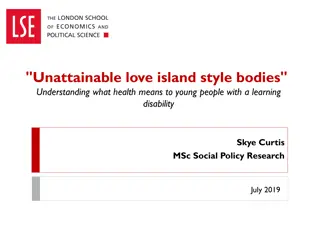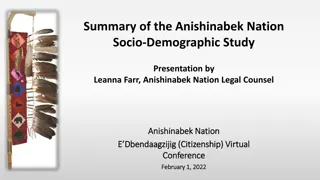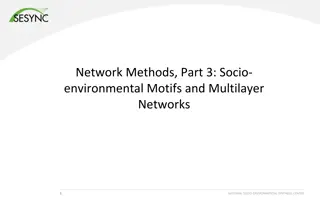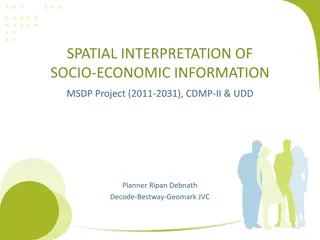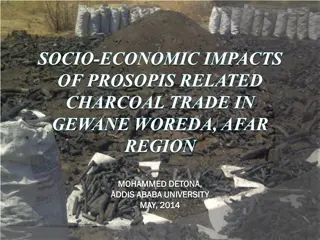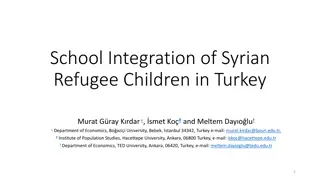Understanding Sustainable Business Models in the Context of Open Data and Socio-Economic Perspectives
Explore the intricate interplay between sustainable business models, open data practices, and socio-economic perspectives presented by Andrew Coote. Delve into the impacts, assessment methods, and the importance of data accessibility in decision-making. Gain insights into the FAIR principles and the
1 views • 16 slides
Understanding the Purpose and Origin of YESAA Legislation
YESAA, the Yukon Environmental and Socio-economic Assessment Act, was developed in collaboration with Yukon First Nations to ensure environmentally and socially responsible project assessments. The Act, passed in 2003, aims to protect environmental quality, heritage resources, and the well-being of
3 views • 19 slides
Socio-Semantic Analysis of J.F. Odunjo's "Ise L'ogun Ise" and Yoruba Cultural Values
Societal values, cultural identity, and the impact of linguistic forms on social meaning are explored in this study. Through an analysis of J.F. Odunjo's poem "Ise L'ogun Ise" and Yoruba socio-cultural values, the study aims to address the decline in moral standards and societal ethos, advocating fo
0 views • 35 slides
Understanding the Demographic Transition Model
The Demographic Transition Model describes the shift from high birth and death rates to low rates as societies advance technologically and economically. It consists of four stages, each marked by specific characteristics and factors influencing population growth. From high mortality and fertility ra
3 views • 12 slides
Tools and Extensions for NTA and Demographic Dividend in Africa
This content discusses the tools and extensions related to National Transfer Accounts (NTA) and Demographic Dividend in Africa, focusing on quantifying domestic production, consumption, and progress in harnessing demographic dividend. It includes NTA profiles for African countries, NTTA profiles for
2 views • 10 slides
Progress Update on Demographic Accounts Project for June 2022 Delivery
The update covers the progress of the Demographic Accounts project, including proof-of-concept milestones, annual local authority level estimations, model approaches, and data preprocessing. The project aims to deliver demographic accounts by age, sex, and local authority, incorporating data from va
0 views • 15 slides
Factors Influencing Oral Health Care Services Utilization in Murang'a County, Kenya
The study focuses on the utilization of oral health care services in Murang'a County, Kenya. It highlights the burden of oral diseases, factors influencing utilization, research questions, hypothesis, and objectives. The study aims to determine the level of utilization and factors such as socio-demo
0 views • 21 slides
Understanding Demography: Population Trends and Analysis
Demography is the study of population size, distribution, and composition, encompassing elements such as mortality, natality, migration, and demographic forces. Population census plays a crucial role in collecting and analyzing demographic data, with methods like De Jure and De Facto census. Inter-c
5 views • 21 slides
Understanding Socio-Cultural Factors of Abnormal Behavior in Psychology
Exploring the impact of socio-cultural factors on abnormal behavior, this article delves into the influence of societal pressures, cultural norms, and economic status on mental health. The socio-cultural model emphasizes how societal criteria shape perceptions of abnormality, highlighting the role o
0 views • 7 slides
Demographic Human Capital DGE Model for High-Growth Scenarios in Rwanda
This study focuses on a Demographic Human Capital Dynamic General Equilibrium (D-DGE) model for analyzing high-growth scenarios in Rwanda from 2016 to 2050. It explores the interactions of demographic dynamics, human capital, public infrastructure, and debt within a long-term growth framework. The m
0 views • 28 slides
Harnessing a Demographic Dividend for Equitable Growth: A Gender Perspective
Harnessing a demographic dividend involves leveraging a decrease in fertility rates to shift the population towards a larger working-age group, reducing dependency ratios and creating opportunities for economic and social investments. This process requires the right policies and frameworks. The 3 Es
0 views • 11 slides
Comprehensive Community Engagement Strategy for Local Governance
This detailed plan outlines legal requirements, demographic characteristics, socio-economic factors, and political participation in a community. It includes methods such as website updates, mailings, press releases, TV segments, social media engagement, and community meetings to ensure public input
0 views • 11 slides
Evolution of Socio-Economic Classifications: A Historical Overview
Tracing the evolution of socio-economic classifications from Registrar General's Social Class in 1913 to National Statistics Socio-economic Classification in 2020, highlighting key changes and terminologies over the years.
0 views • 6 slides
Exploring Socio-Cultural Beliefs Impact on Community Health Insurance in Nigeria
In Nigeria, the demand for Community Based Social Health Insurance Programs (CBSHIP) is influenced by socio-cultural beliefs. This case study conducted in Ondo Residents delves into the challenges and opportunities faced in ensuring universal health coverage, particularly in rural areas. By examinin
0 views • 13 slides
Challenges and Opportunities in China's Demographic Dividend
China's rapid economic growth was fueled by its demographic dividend, but it now faces challenges such as population aging, rising labor costs, and avoiding the middle-income trap. The country has transitioned to a "new normal" of slower growth, structural changes, and evolving growth drivers. Under
0 views • 63 slides
Understanding Demography and Population Dynamics
Demography is the scientific study of human population focusing on changes in size, composition, and distribution. Forces such as mortality, fertility, and migration impact population changes. The transition from a developing to a developed country involves passing through various stages with differ
0 views • 30 slides
Socio-Economic Impacts of Offshore Wind Farm Projects: A Study on Marine Renewable Energy
The paper presented at the IAIA Brisbane Session delves into the socio-economic impacts of Offshore Wind Farm (OWF) projects, focusing on the EU context, the range of impacts, research methodologies, and predicted versus actual impacts. The study reviews Environmental Statements (ESs) and case studi
0 views • 12 slides
Demographic Comparison for Representativeness in Oregon ACT Program Evaluation Focus Groups
The study evaluates the representativeness of focus group samples in the Oregon ACT Program. It compares demographic characteristics such as age, gender, race/ethnicity, medication use, and days homeless between the entire ACT population and focus group participants. The findings show differences in
0 views • 28 slides
Global Best Practices for Optimizing RE/EE Socio-Economic Impacts
The SE4JOBS Project aims to identify and analyze global best practices in optimizing socio-economic impacts through RE/EE deployment in developing and emerging countries. By examining key variables and causal relationships, the project seeks to inspire policy debates and decision-making processes to
0 views • 10 slides
Dealing with Metadata in the Spoken BNC2014: An Insightful Study
Delving into the metadata of the Spoken BNC2014, this study by Robbie Love at Lancaster University focuses on regional categorization, socio-economic status, and advancements towards dual compatibility with the BNC1994. With over 800 hours of recordings and nearly 700 unique speakers contributing to
0 views • 39 slides
Sociocultural Dynamics of Food (In)security Among Farm Households in Oyo State, Nigeria
This doctoral dissertation seminar explores the sociocultural dynamics of food security among farm households in Oyo State, Nigeria. It delves into demographic characteristics, food production and consumption patterns, socio-cultural drivers of behaviors, and factors influencing food security. The s
0 views • 33 slides
Demographic Analysis and Changes in M250 Module Engagement
The M250 module underwent significant changes in 2021, introducing a new curriculum with practical activities and automated feedback features. The demographic analysis revealed a majority of students aged 25-34, with completion rates varying across different demographic groups. Overall, students fou
0 views • 28 slides
Awareness and Techniques of Garment Recycling Among Housewives
This seminar conducted at S.M. Patel College of Home Science focused on studying the awareness of garment recycling and techniques adopted by housewives from different socio-economic backgrounds. The study aimed to promote the reuse and reprocessing of textiles to reduce waste. Through data collecti
0 views • 22 slides
Socio-economic Data Analysis of Selected Villages in Mandalay
This report presents detailed socio-economic data from selected villages in Mandalay, including information on ethnicity, religion, socio-economic background, availability of electricity, civil society groups and activities, source of credit, and water sources. The data provides insights into the de
0 views • 8 slides
Obesity Challenge in Ghanaian Women: Levels, Consequences & Interventions
The study explores obesity levels in Ghanaian women, highlighting correlations with socio-demographic factors such as age, wealth index, education, and urban/rural residence. The research indicates high rates of obesity alongside childhood under-nutrition in lower-income settings. Proposed intervent
0 views • 24 slides
Understanding Demographic Overlay Reports for Education Accountability
Demographic Overlay Reports play a crucial role in education accountability by certifying student demographics for assessment purposes. This report, sourced from district Student Information Systems (SIS), requires careful review to ensure accurate data transmission to the assessment platform. Any d
0 views • 15 slides
Promoting Equality in Wales: Implementing the Socio-economic Duty
The Welsh Government is prioritizing equality and human rights, especially in the context of Brexit, by commencing the socio-economic duty outlined in the Wales Act 2017. This duty requires specified public bodies to consider how their decisions can reduce inequalities associated with socio-economic
0 views • 13 slides
Factors Influencing Dropout in Outpatient Alcohol Addiction Treatment
This study investigates the reasons behind patient dropouts in outpatient alcohol addiction treatment programs. It focuses on various factors such as socio-demographic characteristics, alcohol- and treatment-related variables, health-related quality of life, and cognitive impairments. The research i
0 views • 18 slides
Equity Gaps Among Potential Students: Fall 2016 Analysis
Examination of equity gaps among potential students applying but not enrolling in Fall 2016 at Crafton Hills. The study investigates demographic characteristics (ethnicity, gender, age) and engagement behaviors through application, orientation, and assessment data. Disproportionate impact and statis
1 views • 13 slides
Influence of Personal Demographic and Institutional Variables on Venture Creation in Small Technology-Oriented Ventures
This research study explores the impact of personal demographic and institutional factors on venture creation in small technology-oriented ventures. It delves into the influence of individual characteristics like age, gender, education, and social institutions such as family role models on entrepren
0 views • 39 slides
Demographic Shifts in Central and Eastern Europe Post-1989: A Closer Look
The collapse of state socialism in Central and Eastern Europe in 1989-91 brought about significant changes, leading to economic and social transformations. The region experienced new political and economic freedoms, although inequalities grew. Unique demographic divides between East and West Europe
0 views • 43 slides
Socio-Economic Study of Dafili Water Scheme and Management Structure
Presentation by Mike Wood, WASH Adviser, on the socio-economic and tariff study conducted in Dafili. The study aimed to gather data on the community's ability and willingness to pay for water, recommend affordable tariffs, and assess sanitation and hygiene awareness. Methods included household surve
0 views • 29 slides
Dafili Socio-Economic & Tariff Study Presentation Summary
Presentation delivered by Mike Wood at a CMP meeting in Dukem on June 19, 2013, focused on a socio-economic and tariff study for the Dafili community. The study aimed to gather demographic data, assess the community's ability and willingness to pay for water, recommend affordable tariffs, and evalua
0 views • 29 slides
Demographic Trends and Future Projections: A Comprehensive Analysis
Explore the demographic transformation from past to future, including population growth rates, urbanization trends, and county-level projections in Utah. Learn about the impact of migration on population change and key factors influencing demographic shifts. Data sources include the Bureau of the Ce
0 views • 50 slides
Understanding Health Perceptions of Young People with Learning Disabilities
This research delves into how young individuals with learning disabilities perceive health, exploring the concepts of physical, mental well-being, and the impact of socio-economic factors on health outcomes. Through interviews and focus groups, the study reveals diverse perspectives on health behavi
0 views • 12 slides
Insights from Anishinabek Nation Socio-Demographic Study Presentation
An overview of the Anishinabek Nation Socio-Demographic Study presented by Leanna Farr focused on various factors such as language usage, population trends, legislative impacts, and projections related to the Registered Indian population growth. The study highlights demographic shifts, language patt
0 views • 16 slides
Exploring Socio-Environmental Motifs and Multilayer Networks
The content delves into socio-environmental motifs, anti-motifs, and multi-plex networks in the context of national socio-environmental synthesis centers. It uncovers the least likely and common occurrences in random networks, as well as common subnetworks underrepresented in the model of inquiry. T
0 views • 7 slides
Spatial Interpretation of Socio-Economic Information in Urban Area
The project focuses on analyzing socio-economic data in Mymensingh Municipality from 2011 to 2031. It includes field verification findings, spatial interpretation results, maps/figures representing family and settlement types, and considerations for urban planning. The presentation outlines basic in
0 views • 35 slides
Socio-Economic Impacts of Prosopis-Related Charcoal Trade in Gewane Woreda, Afar Region
The study explores the socio-economic impacts of the charcoal trade related to Prosopis in Gewane Woreda, Afar Region. It delves into the context of the charcoal trade, the organization of trade and actors involved, costs and benefits, governmental regulations, and provides conclusions and recommend
0 views • 15 slides
School Integration of Syrian Refugee Children in Turkey: Key Findings
The study investigates schooling outcomes of native and refugee children in Turkey, highlighting disparities in enrollment, school performance, employment, and marriage. Analyzing data from the Turkey Demographic and Health Survey, the research reveals that socio-economic factors play a significant
0 views • 26 slides


